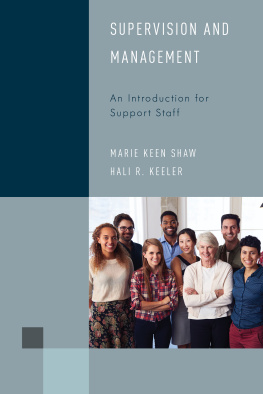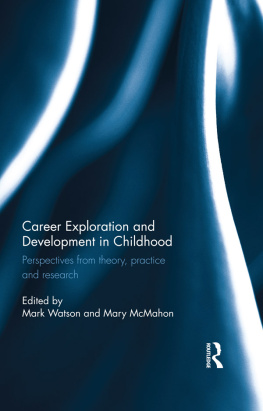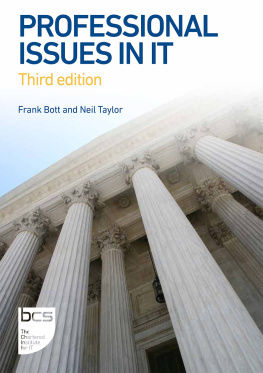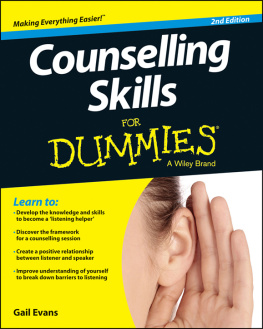Becoming a Counsellor
Praise for the book
This easy to read book is designed to offer support to students throughout their training. It answers many questions and guides the reader to useful additional texts for further study. The author has a remarkable capacity to recognise the needs of the trainee counsellor and to focus on a wide spectrum of subjects. This student companion is packed with a wealth of information on theory and practice and includes helpful activities. It is an ideal text for all levels of training courses. No counselling student should be without a copy. Irene Hill, Counselling Curriculum Head, Adam Smith College
This is clear, concise and comprehensive. It covers all that a student of counselling should need, and it is written in a style that makes the material easily accessible to students. I particularly like the way that Kirsten has emphasised the practicalities of delivering a counselling service. To paraphrase Donald Winnicott I would say that its more than Good Enough. Itll be on my list of Core Texts for every counselling student from now on. Billy Grier, Lecturer in Counselling, Motherwell College
The professional and personal journey encountered by the trainee counsellor can be both exciting and, at times, arduous. Amis skilfully explores in depth the issues that can arise, from the day-to-day practicalities of the training process, through to the dynamics and processes of the training group. She writes from a position of experience, and brings insight, warmth, humour and a lightness of touch that will, I believe, be a source of support and knowledge for all trainees. I strongly recommend this book for anyone in training, or contemplating it. Everything you had wanted to know about counsellor training but had feared to ask; its all here.
Dr Andrew Reeves, counsellor, supervisor, trainer and editor of Counselling and Psychotherapy Research
This straightforward, easy to read companion is a tremendous support for counselling students at all level. It strikes a good balance between theory and practice and gives lots of useful examples. As a lecturer in FE I will be recommending this book as a key text for my students. Thanks Kirsten for such a useful resource.
Alison Mcbride, Lecturer in FE Motherwell College
Becoming a Counsellor
A Student Companion
KIRSTEN AMIS
Kirsten Amis 2011
First published 2011
Apart from any fair dealing for the purposes of research or private study, or criticism or review, as permitted under the Copyright, Designs and Patents Act, 1988, this publication may be reproduced, stored or transmitted in any form, or by any means, only with the prior permission in writing of the publishers, or in the case of reprographic reproduction, in accordance with the terms of licences issued by the Copyright Licensing Agency. Enquiries concerning reproduction outside those terms should be sent to the publishers.
SAGE Publications Ltd
1 Olivers Yard
55 City Road
London EC1Y 1SP
SAGE Publications Inc.
2455 Teller Road
Thousand Oaks, California 91320
SAGE Publications India Pvt Ltd
B 1/I 1 Mohan Cooperative Industrial Area
Mathura Road
New Delhi 110 044
SAGE Publications Asia-Pacific Pte Ltd
33 Pekin Street #02-01
Far East Square
Singapore 048763
Library of Congress Control Number: 2010934967
British Library Cataloguing in Publication data
A catalogue record for this book is available from the British Library
ISBN 978-1-84860-881-8
ISBN 978-1-84860-882-5 (pbk)
Typeset by C&M Digitals (P) Ltd, Chennai, India
Printed and bound in Great Britain by TJ International Ltd, Padstow, Cornwall
Printed on paper from sustainable resources
For Andy. Without his patience and understanding, this book wouldnt exist.
Contents
About the Author
Kirsten Amis is a full-time lecturer in counselling at Anniesland College in Glasgow where she also coordinates the student counselling service. Her research interests include counselling education, addictive behaviours and client dependency issues. She has twenty years of counselling experience within NHS, voluntary and private practice environments, and experience working with addictive behaviours. Kirsten is a Scottish Qualifications Authority Qualification Development Specialist for Counselling and is also a Director on the Board of Management for Cowal Council on Alcohol and Drugs where she provides counselling supervision.
An Introduction to Counselling Training
This first chapter is a basic introduction to some of the underlying principles of studying counselling, incorporating some pointers as to how to make best use of this book. The text is designed as a companion for you during your course and contains hints on how to pass your course along with some reasons why certain elements are included within your course and their use to you as a student.
WHICH LEVEL INTRODUCTORY, UNDERGRADUATE OR POSTGRADUATE?
The content of this book has been designed to be appropriate for any level of training if you are just starting to study counselling. Many counselling students are already qualified in other professions and are seconded onto a postgraduate course so, despite being enrolled on an advanced course, it can still be a relatively new subject. Because of this, you may find that chapters apply to some courses and not others; for example, an undergraduate course may not involve primary research whereas a post-graduate course may not include a residential element. Rather than reading from start to finish, consider using the Contents and Index pages to dip in and out depending upon your current area of interest. The book has been designed to include both the process of attending classes to learn about counselling along with the theory and practice that this is based on. Throughout, the focus is on learning to work therapeutically with adults rather than with children, adolescents or specialist groups such as those living with addictive behaviours.
You will find that there are activities throughout the book. These can be completed in isolation to help you focus on particular issues, or they can be used as prompts to help if you become stuck when writing your personal journal or, alternatively, as mini self-tests so you can monitor your progress and understanding.
At the end of each chapter there are recommended reading titles listed so that if this is an area of particular interest you can expand your reading into this subject. Relevant references are also cited throughout so that, again, you are able to access the source texts that quotes originate from and read further articles, books and websites on areas covered within this book.
TERMINOLOGY
For simplicity, the term used for the practice of therapeutic talking within this book will be counselling rather than psychotherapy as many of the skills are shared, and at this stage we are not going to join the debate regarding any similarities and differences of the two activities. Those receiving the service will be called clients rather than service users or patients, simply as this doesnt discriminate between settings, individuals or their issues. Those currently studying counselling will be referred to as a student rather than trainee, again to increase clarity and avoid making a distinction between levels and content of courses.










